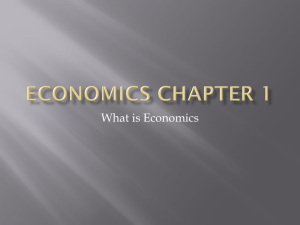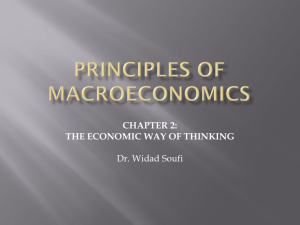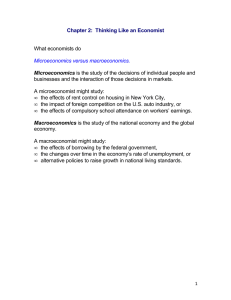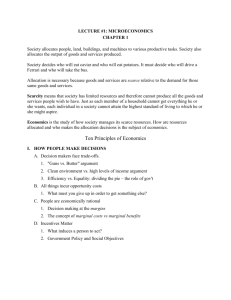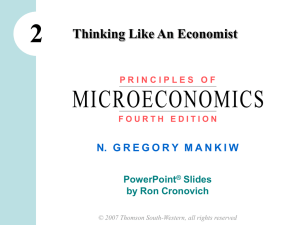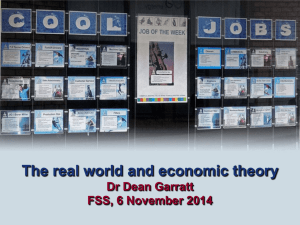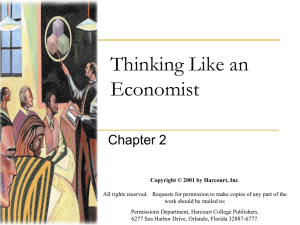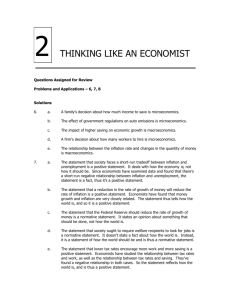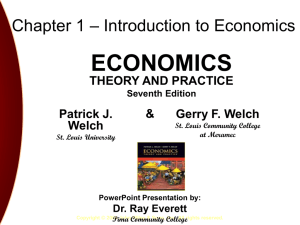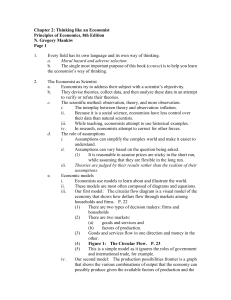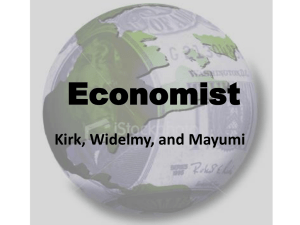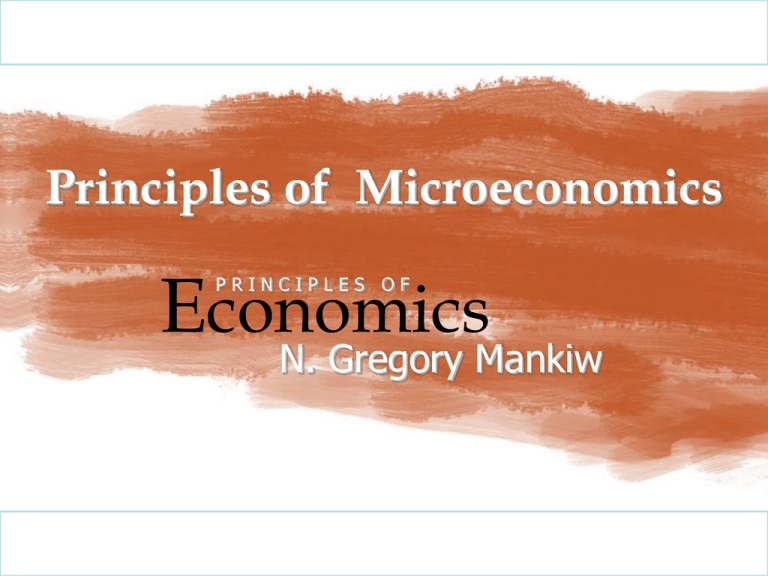
CHAPTER
Principles of Microeconomics
Economics
PRINCIPLES OF
N. Gregory Mankiw
© 2009 South-Western, a part of Cengage Learning, all rights reserved
In this section, we will cover:
What is Economics?
Basic Principles
Production Possibilities Frontier
Economists as Policy Advisors
1
Economy. . .
. . . The word economy comes from a Greek word
for “one who manages a household.”
Definition of Economics:
the study of how society manages its scarce
resources.
How do we go from managing a
household to managing an economy?
A household and an economy face many decisions:
Who will work?
What goods and how many of them should be
produced?
What resources should be used in production?
At what price should the goods be sold?
Society and Scarce Resources:
The management of society’s resources is
important because resources are scarce.
Scarcity. . . means that society has limited
resources and therefore cannot produce all the
goods and services people wish to have.
Microeconomics and Macroeconomics
Microeconomics is the study of how households
and firms make decisions and how they interact
in markets.
Macroeconomics is the study of economy-wide
phenomena, including inflation, unemployment,
and economic growth.
These two branches of economics are closely
intertwined, yet distinct – they address different
questions.
5
HOW PEOPLE MAKE DECISIONS
Principle #1: People Face Tradeoffs
All decisions involve tradeoffs.
Society faces an important tradeoff:
efficiency vs. equality
Efficiency: when society gets the most from its
scarce resources
Equality: when prosperity is distributed uniformly
among society’s members
6
HOW PEOPLE MAKE DECISIONS
Principle #2: The Cost of Something Is
What You Give Up to Get It
Making decisions requires comparing the costs
and benefits of alternative choices.
The opportunity cost of any item is
whatever must be given up to obtain it.
It is the relevant cost for decision making.
7
HOW PEOPLE MAKE DECISIONS
Principle #3: Rational People Think at the
Margin
Principle #4: People Respond to Incentives
Principle #5: Trade Can Make Everyone
Better Off
8
HOW PEOPLE INTERACT
Principle #6: Markets Are Usually A Good Way
to Organize Economic Activity
The invisible hand works through the price system:
The interaction of buyers and sellers
determines prices.
Each price reflects the good’s value to buyers
and the cost of producing the good.
Prices guide self-interested households and
firms to make decisions that, in many cases,
maximize society’s economic well-being.
9
HOW PEOPLE INTERACT
Principle #7: Governments Can Sometimes
Improve Market Outcomes
Principle #8: A country’s standard of living
depends on its ability to produce goods &
services.
Principle #9: Prices rise when the
government prints too much money.
10
Section 2
Models and Perspectives
This section introduces:
- Production Possibility Frontier
- Positive vs. normative statements
- Why economists disagree!
13
Our Second Model:
The Production Possibilities Frontier
The Production Possibilities Frontier (PPF):
a graph that shows the combinations of
two goods the economy can possibly produce
given the available resources and the available
technology
Example:
Two goods: computers and wheat
One resource: labor (measured in hours)
Economy has 50,000 labor hours per month
available for production.
THINKING LIKE AN ECONOMIST
14
PPF Example
Production
Point
on
Comgraph puters Soju
Soju
(trucks)
6,000
5,000
A
500
E
0
D
4,000
B
400
1,000
3,000
C
250
C
2,500
2,000
D
100
4,000
E
0
5,000
Tradeoff is based
on opportunity
cost!
B
1,000
A
0
0
100
200
300
400
500
600
Computers
15
Economic Growth and the PPF
With additional
resources or an
improvement in
technology,
the economy can
produce more
computers,
Wheat
(tons)
6,000
more wheat,
or any combination
in between.
Economic
growth shifts
the PPF
outward.
5,000
4,000
3,000
2,000
1,000
0
0
100 200 300 400 500 600
Computers
THINKING LIKE AN ECONOMIST
16
The Economist as Policy Advisor
As scientists, economists make
positive statements,
which attempt to describe the world as it is.
As policy advisors, economists make
normative statements,
which attempt to prescribe how the world should be.
Positive statements can be confirmed or refuted,
normative statements cannot.
Govt employs many economists for policy advice.
E.g., the U.S. President has a Council of Economic
Advisors, which the author of this textbook chaired
from 2003 to 2005.
17
Why Economists Disagree
Economists often give conflicting policy advice.
They sometimes disagree about the validity of
alternative positive theories about the world.
They may have different values and, therefore,
different normative views about what policy
should try to accomplish.
Yet, there are many propositions about which
most economists agree.
THINKING LIKE AN ECONOMIST
18

